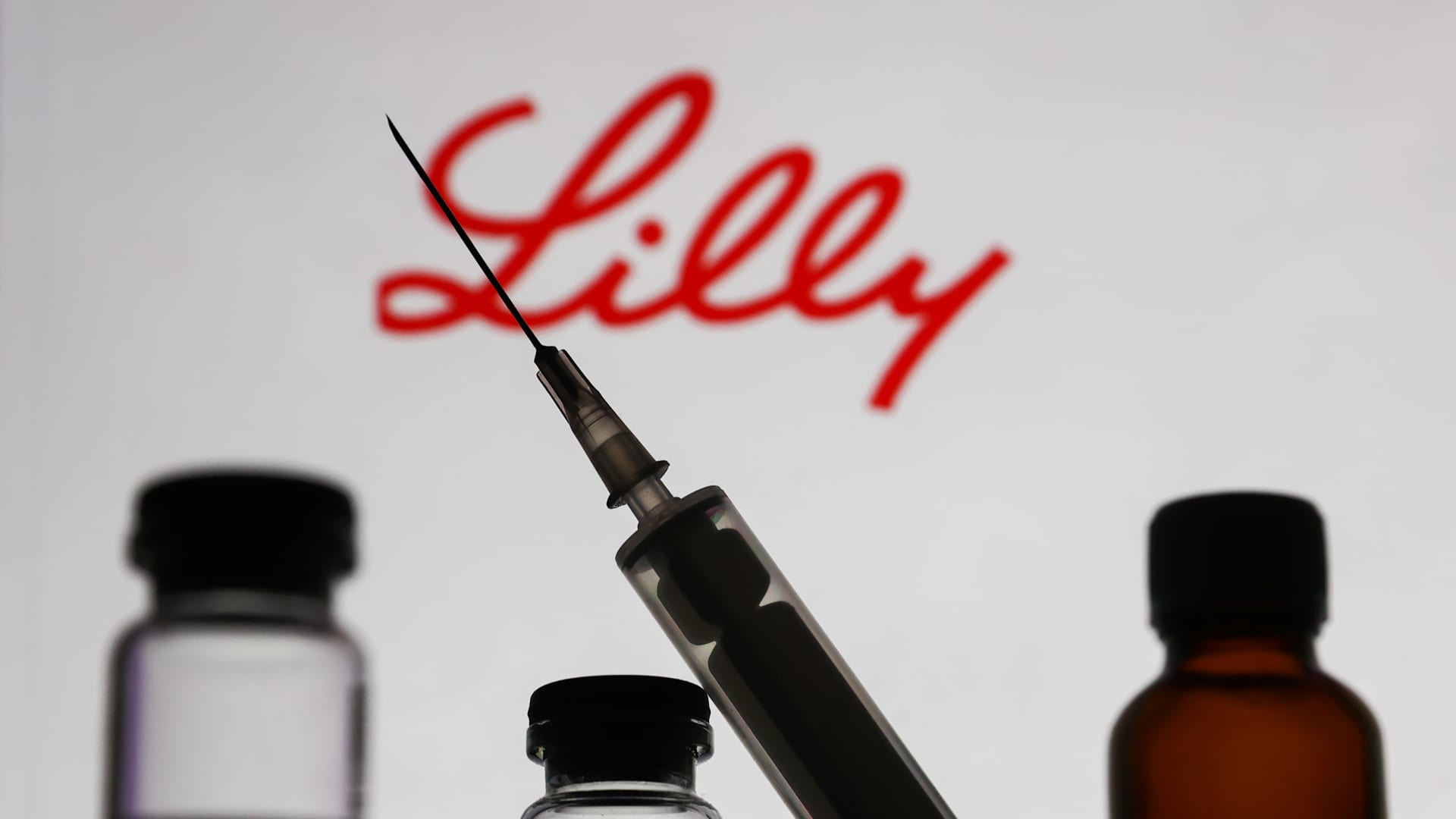
Medical bottles and syringe are seen with Eli Lilly and Company logo displayed on a screen in the background in this illustration photo taken in Krakow, Poland on November 10, 2022.
Jakub Porzycki | Nurphoto | Getty Images
Eli Lilly‘s experimental Alzheimer’s drug lowered levels of brain plaque in patients who are in the earliest stages of the devastating disease, initial data shows.
A higher dose of the up-and-coming treatment, remternetug, had a larger effect on clearing amyloid plaque, according to early clinical trial data the company presented during a conference in Sweden on Friday.
Amyloid is a protein that builds up on the brain in Alzheimer’s patients and disrupts cell function. Researchers have argued that accumulation of amyloid plaque is a crucial first step toward the cognitive decline observed in Alzheimer’s disease.
The early data comes as Eli Lilly continues its decades-long bid to bring an Alzheimer’s drug to the market. Remternetug follows another drug called donanemab and failed treatment solanezumab. Remternetug and donanemab target plaque deposited on the brain, while solanezumab focused on the kind that floats in brain fluid.
The remternetug trial featured 41 patients in the early stages of Alzheimer’s disease. They were randomized to receive infusions of a placebo or remternetug in various dose sizes every four weeks.
Eli Lilly found the drug caused a “rapid and robust” clearance of amyloid plaque, the presentation said. Clearing amyloid plaque is defined as lowering the level to 24.1 centiloids — a unit used to measure amyloid in the brain — or less.
Plaque levels were “dose-dependent,” the company said. The majority of patients who received remternetug at the three highest dose sizes saw amyloid plaque cleared by day 169 of the study.
The Indianapolis, Indiana-based company is conducting an ongoing phase three trial on remternetug, but it did not indicate which dose sizes are being studied. Eli Lilly expects to complete the trial in 2025.
The results suggest remternetug “may provide more robust plaque removal” than donanemab, said J.K. Wall, an Eli Lilly spokesperson.
A phase two trial of donanemab found 40% of participants treated with the drug achieved amyloid clearance as early as six months, or around 182 days, after starting the treatment.
But Wall added that it’s too early to make quantitative comparisons of the two drugs.
Akash Tewari, an equity analyst at Jefferies, also highlighted “hints of faster amyloid clearance with remternetug vs donanemab” in a Friday note. But Tewari said it’s unclear if clearing amyloid plaque will lead to clinical benefits like a reduction in cognitive decline.
He noted that some research has demonstrated a causal relationship between plaque removal and the rate of cognitive decline, but “we haven’t seen this supported in donanemab’s” data.
Tewari also compared the two drugs’ safety profiles. He estimates that remternetug could show similar or higher rates of a problematic brain swelling side effect compared to donanemab.
Eli Lilly observed the side effect – known as amyloid-related imaging abnormality, or ARIA – in 10 out of 24 patients who received remternetug. One of those patients stopped the treatment due to a serious adverse event.
ARIA has dogged similar Alzheimer’s drugs from other companies, such as Biogen and Eisai’s Leqembi. The companies expect the Food and Drug Administration to grant full approval of Leqembi by the summer.
An estimated 6.7 million Americans age 65 and older are living with Alzheimer’s, according to the Alzheimer’s Association. By 2050, that group is projected to rise to almost 13 million.
One in three seniors die with Alzheimer’s or another form of dementia, which kills more people than breast cancer and prostate cancer combined, the association said.







